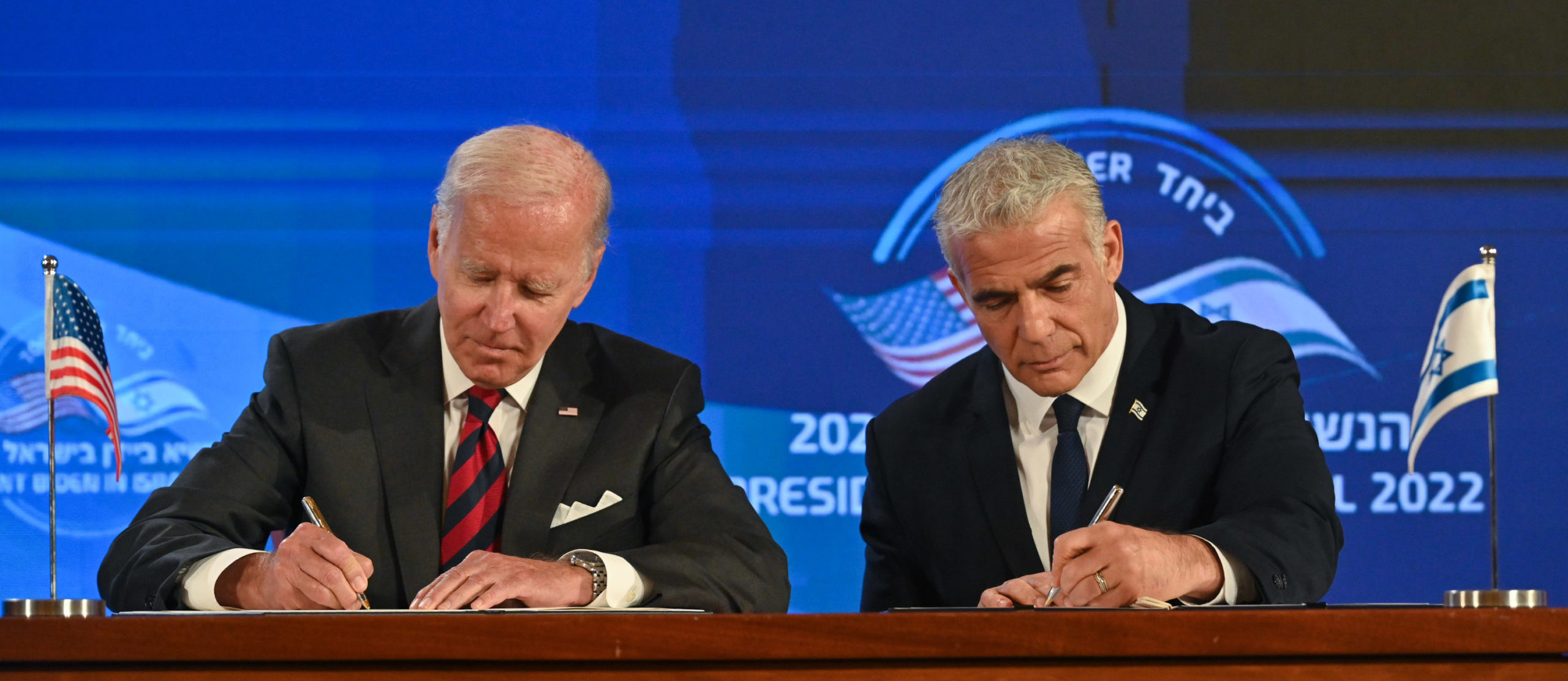The purpose of US President Joe Biden’s visit to Israel was made clear on Thursday.
Just before taking the podium, President Biden and Prime Minister Yair Lapid signed a joint pledge confirming US support for Israel.
In the Jerusalem Declaration, whose formal title is the Jerusalem US-Israel Strategic Partnership Joint Declaration, the two countries “reaffirm the unbreakable bonds between our two countries and the enduring commitment of the United States to Israel’s security,” as well as US support for Israel’s regional military edge and ability “to defend itself by itself.”

US President Joe Biden and Israeli Prime Minister Yair Lapid sign the Jerusalem Declaration at the Waldorf Astoria Hotel in Jerusalem on July 14, 2022. (Kobi Gideon/GPO)
During the press conference at the Waldorf Astoria Jerusalem hotel, both leaders focused on one topic and that is Iran, and its nuclear program.
President Biden told a hall packed with journalists that the new security pact underlines US support for Israel and reinforces the two countries’ unity on Iran.
He pledged to use “all” American power to stop the Islamic Republic from acquiring nuclear weapons.
Diplomacy will not stop them. The only thing that will stop Iran is knowing that if they continue to develop their nuclear program the free world will use force.
Lapid reiterated his country’s position on Iran, threatening the use of military force and insisting that “words” and “diplomacy” were not enough to stop Iran’s nuclear ambitions.
This holiday season, give to:
Truth and understanding
The Media Line's intrepid correspondents are in Israel, Gaza, Lebanon, Syria and Pakistan providing first-person reporting.
They all said they cover it.
We see it.
We report with just one agenda: the truth.


“Diplomacy will not stop them. The only thing that will stop Iran is knowing that if they continue to develop their nuclear program the free world will use force. The only way to stop them is to put a credible military threat on the table,” Lapid told reporters standing next to the American president.
However, President Biden said diplomacy was the best way to prevent Iran from achieving nuclear weapons, insisting that his position was a “guarantee” to provide security for Israel.
He explained that preventing the Islamic Republic from possessing nuclear weapons was “a vital security interest for Israel and the United States and, I would add, for the rest of the world as well.”
The landmark security pact commits the US “never to allow Iran to acquire a nuclear weapon,” stating that it “is prepared to use all elements of its national power to ensure that outcome.”
Responding to a question from a reporter on how long the US was prepared to give stalled nuclear talks, President Biden, who has been an ardent supporter of Israel for decades, said, “We’re not going to wait forever” for a response from the Islamic Republic.
In addition to addressing US unconditional support for Israel, the Jerusalem Declaration deals with broader issues such as Israeli concerns about Iran and its allies in the region, namely Islamist groups Hamas and Islamic Jihad and Lebanon’s Hizbullah movement.
Reacting to the signing of the security pact, Iran warned the US and its allies against undermining regional security.
“I tell the Americans and their regional allies that the Iranian nation will not accept any crisis or insecurity in the region and that any mistake made in this region will be met with a harsh and regrettable response,” Iran’s President Ebrahim Raisi said in televised remarks.
One day before his scheduled meeting with Palestinian Authority President Mahmoud Abbas, President Biden reiterated Washington’s policy of backing “a two-state solution for two peoples, both of whom have deep and ancient roots in this land, living side by side in peace and security.”
However, he made it clear he has no plans to reverse former President Donald Trump’s decision to recognize Jerusalem as Israel’s capital.
John Kirby, the former Pentagon spokesperson who recently became the coordinator for strategic communications at the US National Security Council, told The Media Line to expect an “important” announcement from the meeting between the American and Palestinian presidents.
Israel’s integration in the region, Israel’s peace with its neighbors – these are essential goals
President Biden also talked about his last stop in his Middle East tour in Saudi Arabia and “how important it was from my perspective for Israel to be totally integrated in the region.”
Lapid agreed that the president’s trip to the kingdom “is important for Israel and the region, for our security and the future prosperity of the Middle East.”
“Our hand is outstretched for peace,” Lapid stated in a message he said he wanted the US leader to relay to the Gulf states. “We are ready to share our technology and experience, ready for our people to meet and learn about one another, ready for our scientists to collaborate and our businesses to cooperate.”
President Biden said he will be “carrying a direct message of peace” and will “continue building on the Abraham Accords, which I strongly support because they deepen Israel’s integration in the broader region. … Israel’s integration in the region, Israel’s peace with its neighbors – these are essential goals.”